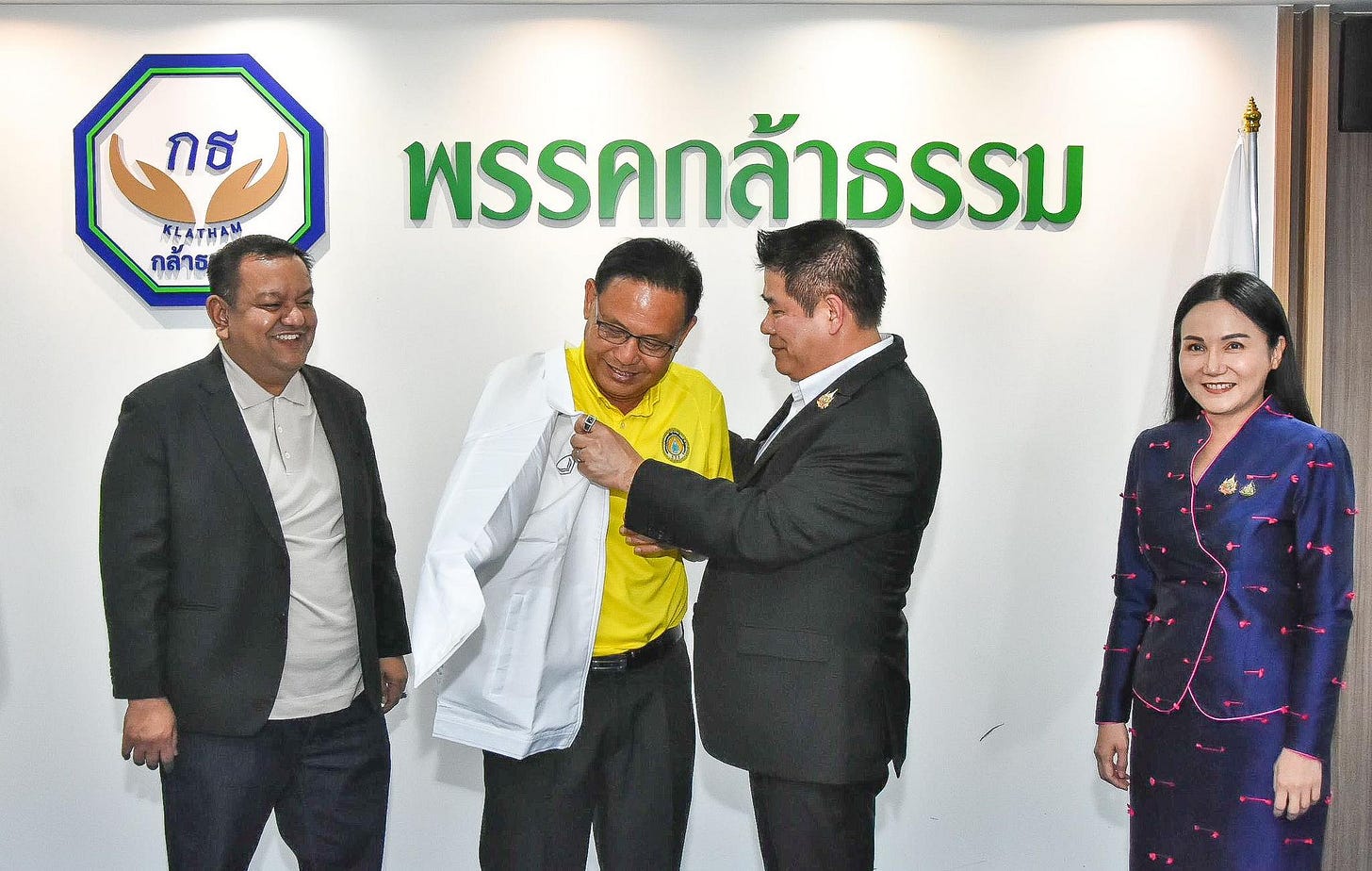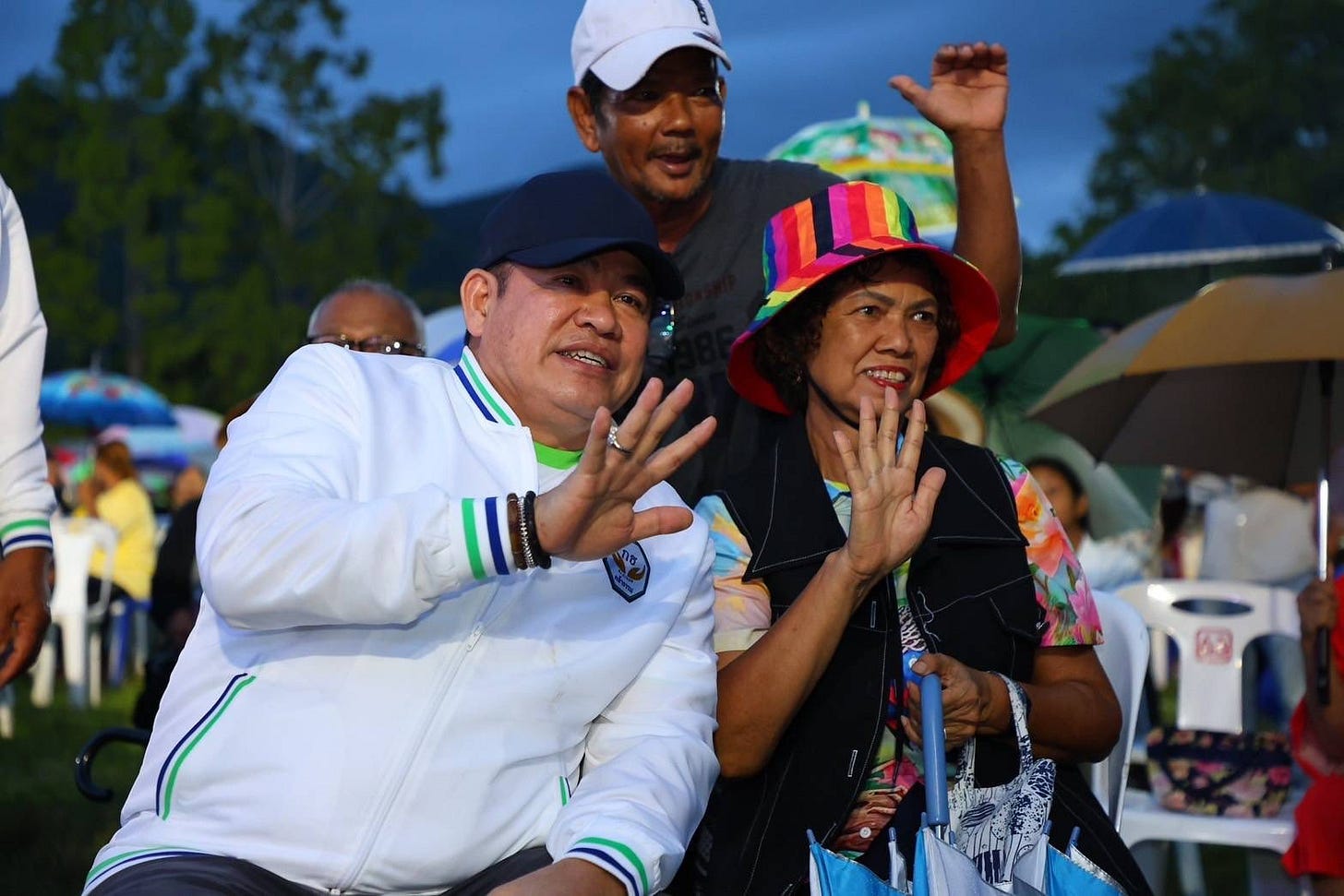Kla Tham Dares to Dream Big
Captain Thammanat bets on all politics being local

In August last year, Captain Thammanat Prompow told reporters that he wished to “declare independence” from his boss, Palang Pracharath party leader Prawit Wongsuwan. “In the past six years I’ve served one person and one party enough,” he said.
It was a rocky six years. The northern boss from Phayao province had originally joined with the Palang Pracharath Party in its quest to seek a second term for former prime minister Prayut Chan-o-cha in 2019 and was rewarded with the post of deputy agriculture minister. But allegations surfaced that Thammanat had once been imprisoned in Australia over a drug trafficking charge (he famously denied this claim by saying that he was carrying flour, not heroin), making him a major point of vulnerability for the Prayut government. Thammanat then orchestrated an unsuccessful plot to oust Prayut as prime minister, for which he was sacked from the cabinet; he briefly left Palang Pracharath to start his own Thai Economic Party but returned after Prayut parted ways with the PPRP to start his own political venture, the United Thai Nation Party.
Through it all, it appeared that Thammanat was loyal to Prawit Wongsuwan, who officially became PPRP leader in 2020. But since the 2023 election, Prawit’s star has been on the wane; the PPRP won only 40 seats at that election, and the election of a new Senate to replace the junta-appointed upper house last year reduced Prawit’s influence even further. Although the PPRP initially joined the Pheu Thai-led coalition, the cabinet reshuffle last year led to Pheu Thai ejecting the PPRP from the government (after heavy rumors of behind-the-scenes conflict between Thaksin and Prawit)1.
It was at this point that Thammanat made his “declaration of independence”: his faction of 20 MPs left the PPRP to join a new party, Kla Tham. (Kla means “courage” and tham refers to the dharma, but the word is a homonym for the phrase “dare to do” in Thai and Tham is of course the first part of the name Thammanat.) In addition to other allied MPs moving from a number of other parties, Kla Tham now possesses 26 MPs, making it the fourth-largest party in the government.
Kla Tham’s political strategy is clear: it will use the tried-and-true method of tapping into local political dynasties to build electoral strongholds. Thammanat was explicit about this in a recent Thai Rath interview, declaring:
Local politics is the root of larger politics. If we cannot build a strong political foundation in each province, bigger-level politics is a difficult matter. You cannot just rely on krasae2. Building a local political foundation is the most important thing.
Thammanat has been true to his word. Kla Tham pulled off a major victory in last month’s Nakhon Sri Thammarat byelection, beating Bhumjaithai (who follows a very similar electoral strategy) and trashing the previously-dominant Democrats. Thammanat also bragged in the Thai Rath interview that in the recent municipal elections, Kla Tham “fielded numerous candidates, mostly from our thessaban network, and they all won. Everywhere we have an MP or a Provincial Administrative Organization chairman, we can control.” His future ambitions are high: he has talked of having over 100 MPs after the next election and expanding Kla Tham’s footprint in several regions. “In some provinces and regions, other parties cannot compete. I will go there because I know these areas have no owner.”

But that is looking ahead to the next general election. In the immediate term, Kla Tham is already set to expand its influence. Some news agencies are already speculating that the party plans to supplant the United Thai Nation Party and become the third-largest party in the coalition by attracting even more MPs. Late last month, Kla Tham leader Naruemon Pinyosinwat said that 10 opposition MPs are set to join the party; one, Krit Chevathamanon, announced his intention to switch to Kla Tham but is unable to officially join the party because the People’s Party refuses to officially expel him. (A People’s Party MP accused Thammanat of spending 55 million baht to lure in defectors, but Thammanat denied these claims, asking which party would be so stupid that it would spend that sort of sum when there is only a little over a year left in this parliament’s term). It’s also possible that around twenty MPs from Suchart Chomklin’s faction in the United Thai Nation Party may switch to Kla Tham at some point in the future.
What should we make of Kla Tham’s expanding power? A few questions remain:
1. To what extent will Kla Tham act as an ally of Pheu Thai? Kla Tham is now facing accusations of being a mere “branch party” of Pheu Thai, after Thammanat said that he consulted with Thaksin on bringing in defectors to the party. The party leadership oppose this characterization, of course. But it’s still clear that Kla Tham offers two key benefits for Pheu Thai. Firstly, Kla Tham’s expanding size gives Pheu Thai leverage over its other coalition partners. If Pheu Thai ever feels the need to eliminate Bhumjaithai from the coalition without risking a collapse of the government (and it has reasons to be annoyed with this supposed ally — see this piece and this piece), a bigger Kla Tham gives it a degree of security. Secondly, if Kla Tham is a more dependable ally for Pheu Thai than Bhumjaithai, then Thaksin will be delighted that Kla Tham can win in places where his party cannot. Decades of anti-Thaksin sentiment means the Pheu Thai brand is probably still radioactive to a degree in the South, but as the Nakhon Sri Thammarat byelection shows, Southerners appear willing to vote for Kla Tham.
2. How successful will Kla Tham’s political strategy be in the future general election? Before the rise of Kla Tham, Bhumjaithai’s successful mix of local strength with flashy national policies (such as support for marijuana) pointed to it becoming the top conservative contender at the next election. But Thammanat’s ambitions are sky-high (100 MPs!) and that will require the party to win in head-to-head confrontations with Bhumjaithai. The party likely poured more resources into the Nakhon Sri Thammarat byelection than Bhumjaithai, but can that scale in a national election? Will the party attract stronger local candidates than Bhumjaithai across the board? And more importantly, although I don’t have polling to support this, I suspect that Thammanat’s personal brand may repel some voters in a way that Bhumjaithai’s leaders do not. Kla Tham has recruited former MPs from the Thai Sang Thai Party to act as its Bangkok strategists in the next election. But even if the party is able to recruit strong local candidates in the capital, recall that Move Forward swept Bangkok in 2023. It would take a lot for a voter looking beyond just their own constituency to switch from a vote for Pita Limjaroenrat to a vote for Thammanat.
But as Thammanat has told the media: “We’re not selling a brand, we’re selling real results.” Time will tell how far this strategy can go. But as befits the party’s name, he is certainly daring to dream big.
ICYMI — it’s been a very busy month in Thai politics. Some recent articles on The Coffee Parliament:
Commentary on the attention being given to Why Nations Fail in Thailand
Analysis on the scrutiny over Thaksin’s stay at the Police General hospital
A refresher on this episode: Senators affiliated with Prawit filed the ethics case that led to Srettha Thavisin’s ouster as prime minister in 2024, leading Thaksin to make remarks implying that Prawit was causing trouble for the government.
A Thai phrase that can be loosely translated as the “popular sentiment.”

